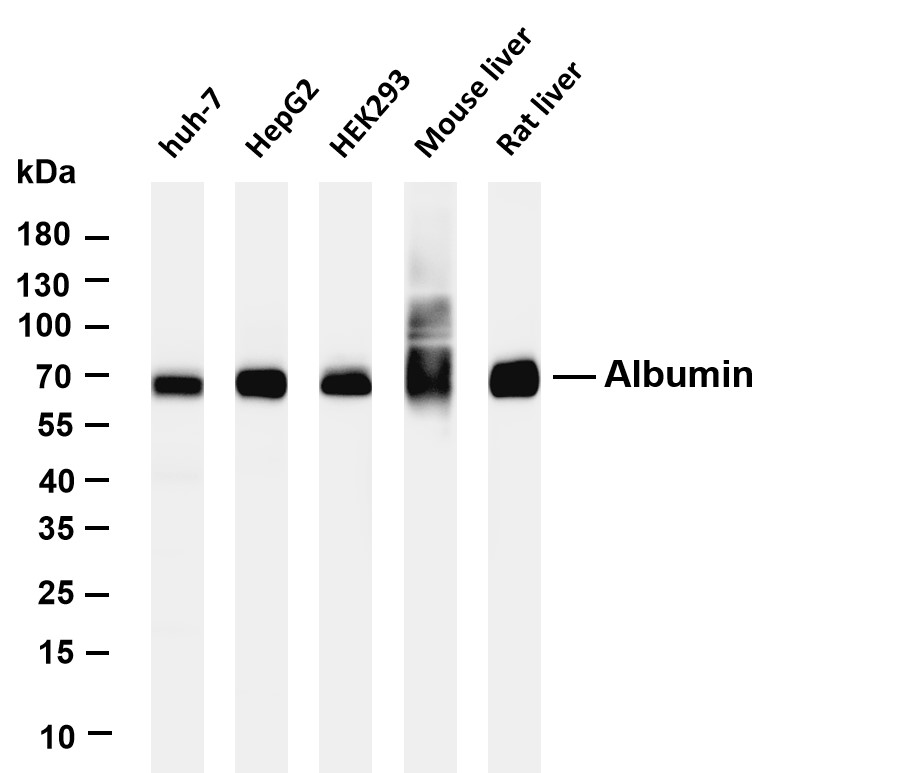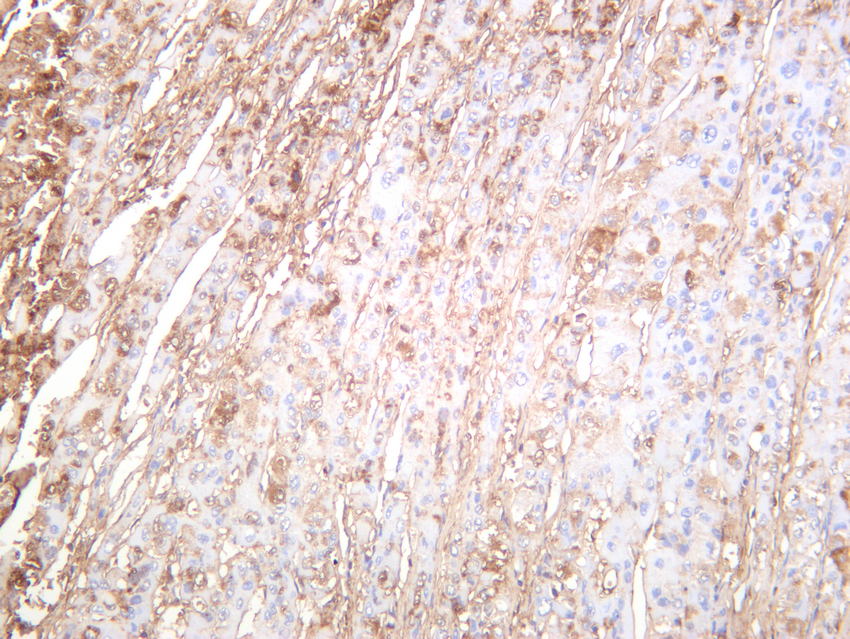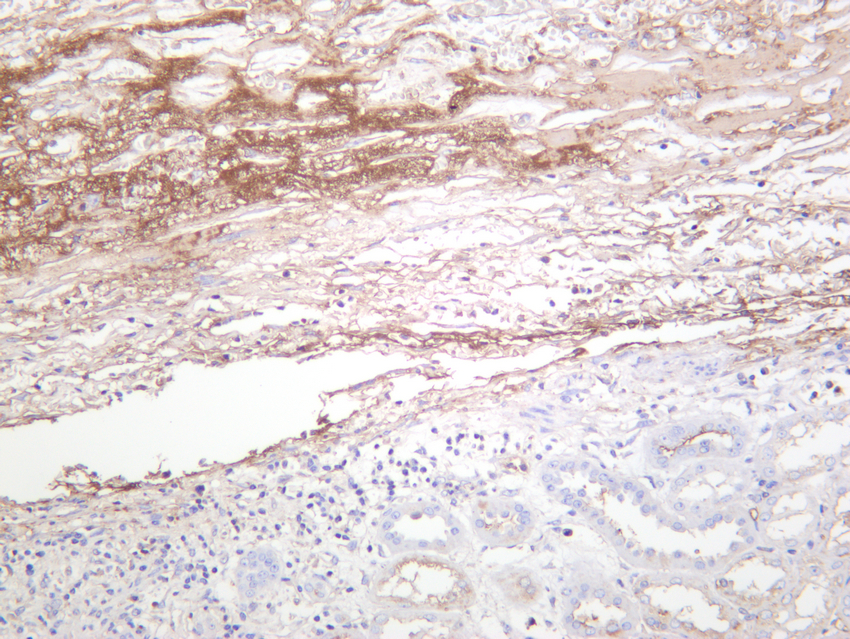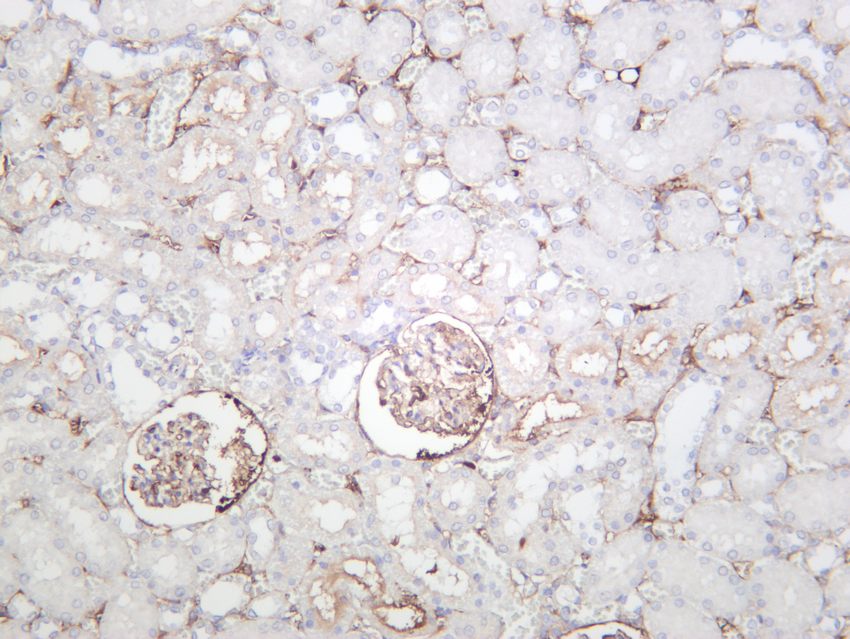Albumin (PT0561R) PT® Rabbit mAb
- Catalog No.:YM8377
- Applications:WB;IHC;IF;IP;ELISA
- Reactivity:Human; Mouse; Rat;
- Target:
- Albumin
- Fields:
- >>Thyroid hormone synthesis
- Gene Name:
- ALB
- Protein Name:
- Serum albumin
- Human Gene Id:
- 213
- Human Swiss Prot No:
- P02768
- Mouse Swiss Prot No:
- P07724
- Specificity:
- endogenous
- Formulation:
- PBS, 50% glycerol, 0.05% Proclin 300, 0.05%BSA
- Source:
- Monoclonal, rabbit, IgG, Kappa
- Dilution:
- IHC 1:500-1:2000;WB 1:2000-1:10000;IF 1:200-1:1000;ELISA 1:5000-1:20000;IP 1:50-1:200;
- Purification:
- Protein A
- Storage Stability:
- -15°C to -25°C/1 year(Do not lower than -25°C)
- Other Name:
- ALB;GIG20;GIG42;Serum albumin
- Molecular Weight(Da):
- 69kD
- Observed Band(KD):
- 69kD
- Background:
- This gene encodes the most abundant protein in human blood. This protein functions in the regulation of blood plasma colloid osmotic pressure and acts as a carrier protein for a wide range of endogenous molecules including hormones, fatty acids, and metabolites, as well as exogenous drugs. Additionally, this protein exhibits an esterase-like activity with broad substrate specificity. The encoded preproprotein is proteolytically processed to generate the mature protein. A peptide derived from this protein, EPI-X4, is an endogenous inhibitor of the CXCR4 chemokine receptor. [provided by RefSeq, Jul 2016],
- Function:
- caution:A peptide arising from positions 166 to 174 was originally (PubMed:3087352 and PubMed:2437111) termed neurotensin-related peptide (NRP) or kinetensin and was thought to regulates fat digestion, lipid absorption, and blood flow.,disease:A variant structure of albumin could lead to increased binding of zinc resulting in an asymptomatic augmentation of zinc concentration in the blood [MIM:194470].,disease:Defects in ALB are a cause of familial dysalbuminemic hyperthyroxinemia (FDH) [MIM:103600]. FDH is a form of euthyroid hyperthyroxinemia that is due to increased affinity of ALB for T(4). It is the most common cause of inherited euthyroid hyperthyroxinemia in Caucasian population.,function:Serum albumin, the main protein of plasma, has a good binding capacity for water, Ca(2+), Na(+), K(+), fatty acids, hormones, bilirubin and drugs. Its main function is the regulation of the collo
- Subcellular Location:
- Secreted
- Expression:
- Plasma.
- June 19-2018
- WESTERN IMMUNOBLOTTING PROTOCOL
- June 19-2018
- IMMUNOHISTOCHEMISTRY-PARAFFIN PROTOCOL
- June 19-2018
- IMMUNOFLUORESCENCE PROTOCOL
- September 08-2020
- FLOW-CYTOMEYRT-PROTOCOL
- May 20-2022
- Cell-Based ELISA│解您多样本WB检测之困扰
- July 13-2018
- CELL-BASED-ELISA-PROTOCOL-FOR-ACETYL-PROTEIN
- July 13-2018
- CELL-BASED-ELISA-PROTOCOL-FOR-PHOSPHO-PROTEIN
- July 13-2018
- Antibody-FAQs
- Products Images

- Various whole cell lysates were separated by 4-20% SDS-PAGE, and the membrane was blotted with anti-Albumin (PT0561R) antibody. The HRP-conjugated Goat anti-Rabbit IgG(H + L) antibody was used to detect the antibody. Lane 1: huh-7 Lane 2: HepG2 Lane 3: HEK293 Lane 4: Mouse liver Lane 5: Rat liver Predicted band size: 69kDa Observed band size: 69kDa

- Human hepatocellular carcinoma was stained with anti-Albumin (PT0561R) rabbit antibody

- Human kidney was stained with anti-Albumin (PT0561R) rabbit antibody

- Rat kidney was stained with anti-Albumin (PT0561R) rabbit antibody



